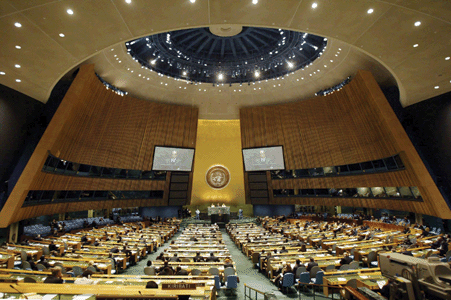Iran Agrees to a First Step Toward Nuclear Accord
Monday, November 25th, 2013November 24, 2013
United States Secretary of State John Kerry has announced that Iran and the international community have reached a deal on Iran’s nuclear program, claiming it will make Israel and the Middle East a safer place. Secretary Kerry characterizes the pact as “a first step in making sure Iran could not have nuclear weapons.”
Iran has agreed, for a limited period, to curb some of its nuclear activities in return for the lifting of some international economic sanctions. Iran has also agreed to stop enriching (concentrating) uranium to create material with more than 5-percent U-235 and to dilute (weaken) much of its existing stores of 20-percent U-235 to 5 percent. Natural uranium contains 0.7 percent of an isotope of uranium known as U-235. U-235 is the only natural isotope of uranium whose nucleus (core) can easily be made to undergo fission—that is, to split into two nearly equal parts. The fission process releases the nuclear energy used in power plants and weapons. Most nuclear reactors at power plants in the United States use fuel that contains about 2- to 4-percent U-235. Nuclear weapons and the reactors for nuclear-powered ships require uranium with concentrations of about 90-percent U-235.
The agreement bars Iran from adding new centrifuges and capping or, in some cases, eliminating, stockpiles of uranium. (Centrifuges are rapidly spinning tubes used to enrich uranium.) In addition, Iran promised to open its nuclear facilities to unprecedented “daily” inspections.
The deal was condemned by the government of Israel as a “historic mistake” that rewards Iran while getting nothing in return. (Former Iranian President Mahmoud Ahmadinejad repeatedly vowed that Iran would “eliminate the Zionist regime,” referring to Israel.)
International affairs experts suggest that the agreement, in fact, presents President Barack Obama with the opportunity to steer a new American course in the Middle East for the first time since the Iranian Revolution in 1979. They point out that after 34 years of estrangement, the United States and Iran have signed a diplomatic accord that opens the door to further progress. “No matter what you think of it, this is a historic deal,” stated Vali R. Nasr–dean of the Johns Hopkins School of Advanced International Studies–in an interview with The New York Times. “It is a major seismic shift in the region. It rearranges the entire chess board.”



